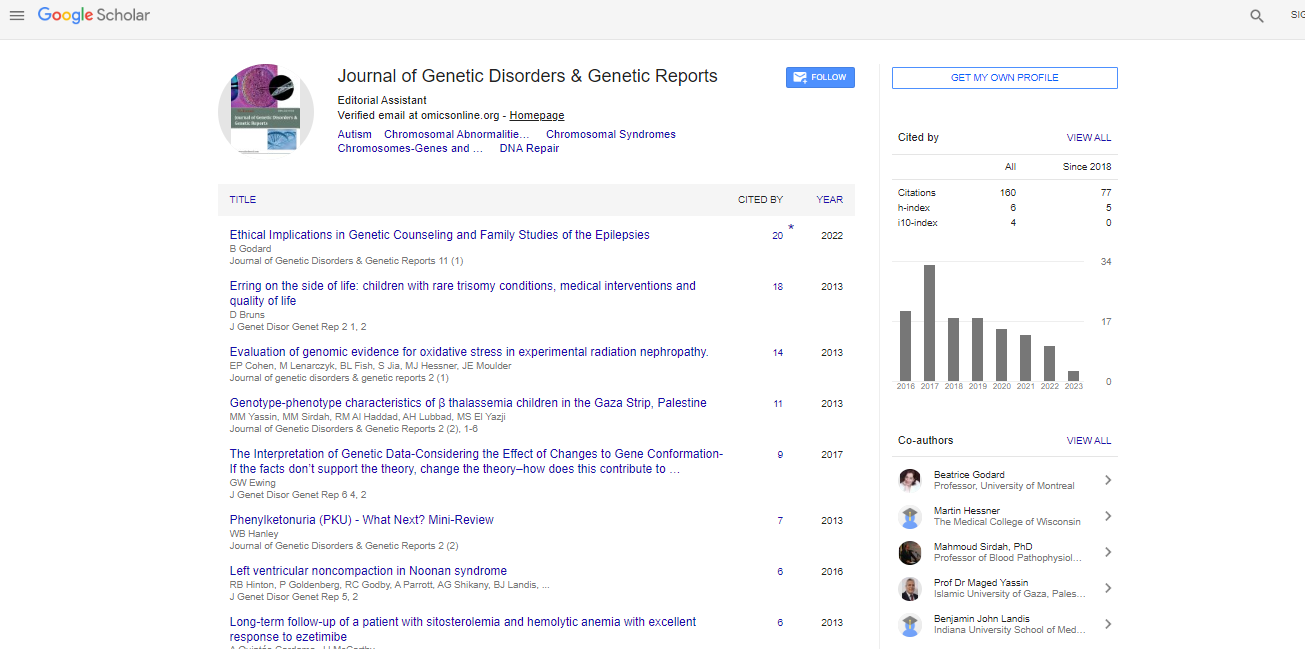Commentary, Vol: 12 Issue: 2
Genetic Epidemiology: Illuminating the Interplay between Genes and Disease
Khaldar Safeukui*
1Department of Hematology, and the Global Health Center, Cincinnati Children’s Hospital Medical Center, Cincinnati OH 45229, USA
*Corresponding Author: khaldar Safeukui
Department of Hematology, and the Global Health Center, Cincinnati Children’s
Hospital Medical Center, Cincinnati OH 45229, USA
E-mail: khaldar@nd.edu
Received date: 29 March, 2023, Manuscript No. JGDGR-23-99518;
Editor assigned date: 31 March, 2023, Pre QC No. JGDGR-23-99518 (PQ);
Reviewed date: 14 April, 2023, QC No. JGDGR-23-99518;
Revised date: 21 April, 2023, Manuscript No. JGDGR-23-99518(R);
Published date: 28 April, 2023, DOI: 10. 4172/2576-1439.1000199
Citation: Safeukui K (2023) Genetic Epidemiology: Illuminating the Interplay between Genes and Disease. J Genet Disor Genet Rep 12:2.
Abstract
The field of epidemiology aims to understand the patterns, causes, and impacts of diseases within populations. Genetic epidemiology, a subfield of epidemiology, focuses on elucidating the role of genetic factors in disease occurrence and distribution. By combining the principles of genetics and epidemiology, this discipline provides valuable insights into the complex interplay between genes and disease. By understanding how genetic variations contribute to disease susceptibility and outcomes, can pave the way for personalized medicine, disease prevention strategies, and advancements in public health. Genetic epidemiology investigates how genetic factors influence the occurrence and distribution of diseases within populations. It explores the genetic variations, such as gene mutations and Single Nucleotide Polymorphisms (SNPs)
Description
The field of epidemiology aims to understand the patterns, causes, and impacts of diseases within populations. Genetic epidemiology, a subfield of epidemiology, focuses on elucidating the role of genetic factors in disease occurrence and distribution. By combining the principles of genetics and epidemiology, this discipline provides valuable insights into the complex interplay between genes and disease. By understanding how genetic variations contribute to disease susceptibility and outcomes, can pave the way for personalized medicine, disease prevention strategies, and advancements in public health. Genetic epidemiology investigates how genetic factors influence the occurrence and distribution of diseases within populations. It explores the genetic variations, such as gene mutations and Single Nucleotide Polymorphisms (SNPs), and their association with disease susceptibility, progression, and response to treatment. The primary objectives of genetic epidemiology are to identify the genetic determinants of diseases, estimate their contribution to disease risk, and understand the underlying mechanisms. This knowledge can lead to the development of targeted interventions, risk assessment models, and personalized therapies. The human genome is composed of approximately 3 billion base pairs, and genetic variation occurs when these base pairs differ between individuals. These variations can influence disease susceptibility by altering gene function, protein expression, or cellular processes. SNPs are the most common form of genetic variation and serve as useful markers in genetic epidemiology studies. Genetic association studies investigate the relationship between genetic variants and disease risk. Two common study designs are candidate gene studies and Genome-Wide Association Studies (GWAS). Candidate gene studies focus on specific genes or genetic regions, while GWAS analyze the entire genome for associations. These studies have led to significant discoveries, linking specific genetic variants to various diseases, including cancer, cardiovascular disorders, and neurodegenerative conditions.
Heritability estimates the proportion of disease risk attributed to genetic factors in a population. It provides insights into the genetic contribution to disease susceptibility. Twin and family studies are valuable tools in determining heritability, as they compare disease concordance between monozygotic identical and dizygotic fraternal twins or within families. These studies have revealed the heritable nature of numerous diseases, including diabetes, asthma, and psychiatric disorders.
Familial aggregation refers to the tendency of certain diseases to occur more frequently among relatives of affected individuals than in the general population. It suggests a genetic component in disease etiology. Assessing familial aggregation can help identify genetic risk factors and estimate disease recurrence risk. Techniques such as pedigree analysis and family-based linkage studies aid in understanding the inheritance patterns and identifying disease-causing genes. Genetic epidemiology recognizes the interplay between genetic factors and environmental exposures in disease development. Geneenvironment interactions occur when the effect of genetic variants on disease risk is modified by environmental factors. For example, certain genetic variations may increase the risk of lung cancer, but only in individuals exposed to tobacco smoke. Understanding these interactions can provide valuable insights into disease mechanisms and guide personalized interventions. Genetic epidemiology investigates complex diseases, which arise from the interplay of multiple genetic and environmental factors.
 Spanish
Spanish  Chinese
Chinese  Russian
Russian  German
German  French
French  Japanese
Japanese  Portuguese
Portuguese  Hindi
Hindi 



